Great Badger Trail ends at Westminster
Westminster, London. Sat31 May 2014
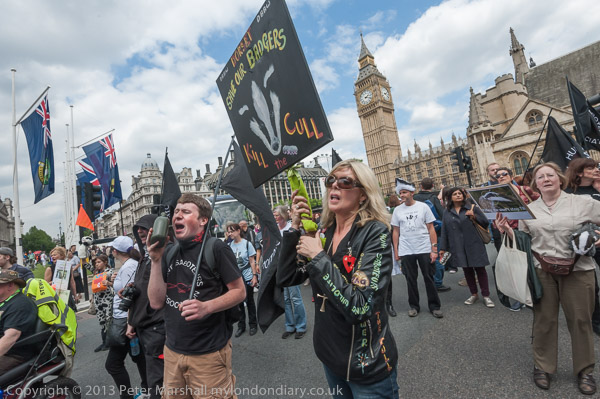
The trail went around Parliament Square then through
the backstreets back to Old Palace Yard
more pictures
The Great Badger Trail 112 mile fund and awareness raising march from Gloucester ended in a rally in London today the day before the government licence to resume its discredited cull is renewed, despite the failure of the pilot culls and weight of scientific evidence against culling.
An independent expert panel reported in March 2014 that controlled shooting alone (or in combination with cage trapping) did not deliver the level of culling set by government. The report also states that it was 'extremely likely that between 7.4% and 22.8% of badgers that were shot at were still alive after 5 min, and therefore at risk of experiencing marked pain'.
Most Bovine TB is not spread by badgers, but by farmers, moving livestock
around and selling cattle with a failure to observe proper measures. A cull
of farmers is not a practical solution, but independent research group Rethink
Bovine TB has proposed an alternative solution that is both practical and
cost effective using evidence from Defra and other sources.
more pictures
Zombie Walk London
Trafalgar Square, London. Sat 31 May 2014
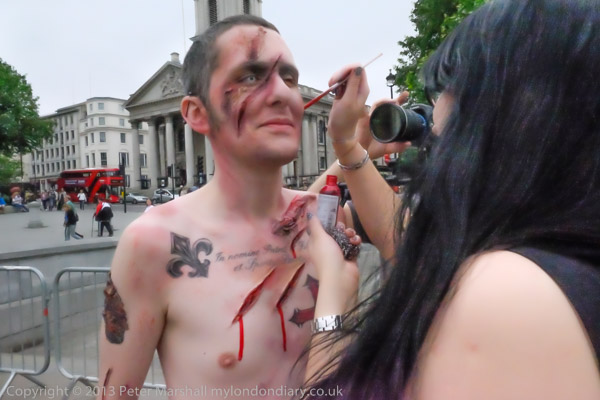
Touching up some zombie scars
more picture
Few Zombies made it to Trafalgar Square for today's zombie walk, but those
who came attracted a great deal of attention from tourists in the square with
some dramatic make-up. My pictures of them include some inadvertently experimental
work. I think zombies are reluctant to emerge on sunny early summer days like
this.
more picture
Gove "Read-In" protest in DfE
Department for Education, Westminster. Fri 30 May 2014
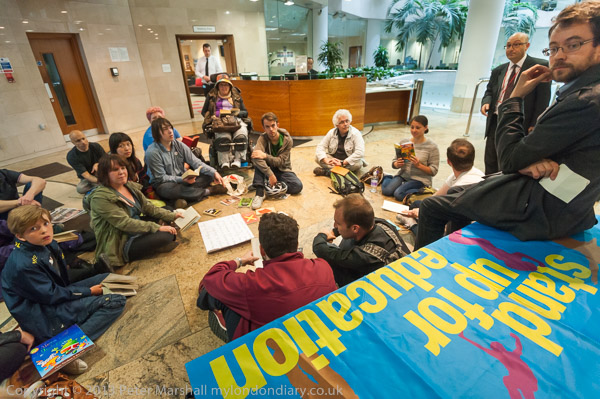
'Stand up for education banner' and class of protesters
in DFE as security orders me out
more pictures
A 'class' of protesters sat down in the foyer of the DfE for an English lesson in protest against Michael Gove's political interference in the curriculum side-lining modern US books, promoting education for the needs of business rather than people.
The protesters had not been stopped coming in to hold their protest class in the foyer, though I heard one of them saying they expected to be ejected when they began to make speeches and display their banner. Unfortunately I was asked to leave before this happened as they were unhappy with the press taking pictures in a public building were there were surely no security implications - though perhaps a high risk - if not a certainty - of the minister and the government being embarrassed.
The DfE issued a statement yesterday denying that Mr Gove had anything to do with the decision to narrow the curriculum and promote a more narrowly nationalist agenda for education - one that will sideline not only modern US literature, but also the great wealth of writers from the Commonwealth who have enriched English literature.
The DfE assert that the decision to put greater insistence on older classes
and modern British writing and the pressure being applied to exam boards to
remove classic American texts such as 'To Kill a Mockingbird' from
their options is a result of consultation with all interested parties, while
the protesters, along with other teachers, examiners, education and literary
professions have launched a mass campaign against what they see as a ministerial
diktat, a clear case of political interference in education. For them, the
DfE statement was simply an uninspired work of fiction.
more pictures
African Liberation Day protest against Vedanta
Mayfair, London. Fri 30 May 2014
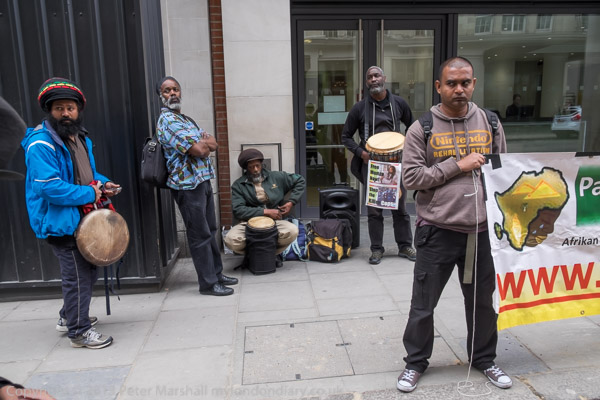
The protest was late to start and only a few had arrived
by the time I had to go
more pictures
African protesters at Vedanta's Mayfair offices held an Afrikan Liberation Day protest over the London listed company owned by Indian billionaire Anil Agarwal alleged to have cheated both Zambia over copper and Liberia over iron ore deals.
Recently a video on YouTube showed Anil Agarwal speaking at an event in India last March, ridiculing the Zambian government for the small amount he paid to buy the mine, and boasting that the that Konkola Copper Mines were giving him US$500 million every year in profit and more. Other sources make it clear that he is also avoiding paying tax on his huge profits there.
Something rather similar appears to have happened with iron ore in Liberia, involving the government giving the Western Cluster to a small company called Elenilto rather cheaply in 2009. That company immediately sold 51% to Vedanta, transferring the rest in a few months.
Vedanta were also taken to court in Zambia over massive pollution of the
Kafue River and a large fine was imposed, although apparently it has not been
paid.
more pictures
London Mosque protest for Sunni extremist
Regents Park Mosque, London. Fri 30 May 2014
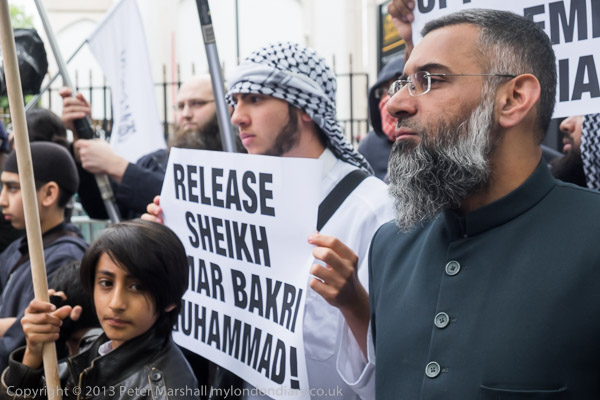
Anjem Choudary listens to speeches outside the mosque
after Friday prayers
more pictures
A protest outside the Regents Park Mosque by Anjem Choudary and his followers supported militant Islamist Omar Bakri Muhammad, held in Lebanon for his support of extremist fighters Islamic State of Iraq and the Levant (ISIL).
Few in the crowds leaving the Mosque after Friday prayers stopped to listen to Anjem Choudary who was speaking when I arrived there.
Police kept the protesters to a narrow area at the rear of the pavement immediately south of the wide entrance way, and attempted to keep a way clear so that people could pass, though many chose to cross the road to avoid them.
As usual for Muslim protests, this was a segregated protest, with around 30 women covered from head to foot in black, most with small slits for their eyes and some holding up posters. They joined enthusiastically in the chanting of slogans, although no women spoke at the event.
Omar Bakri Muhammad came to the UK and claimed asylum in 1986, and became well know while at Finsbury Park Mosque. He spent years building up Hizb ut-Tahrir and was one of the founders of Al Muhajiroun, a radical Islamist group that was banned after the London bombings, in which members of the group were alleged to be involved. He returned to the Lebanon and was told by the Home Office that he would not be allowed back to the UK.
In November 2010 he was convicted in Lebanon of acts of terrorism and sentenced to life with hard labour, but was released on bail when some of his accusers retracted their testimony.
In April 2014 the Lebanese security forces raided his house because of his alleged involvement with militant Sunnis who have attacked Alawites in northern Lebanon and the support he has expressed for the extremist group the Islamic State of Iraq and the Levant fighting in northern Syria, calling on them to set up cells in Lebanon. Omar Bakri had gone into hiding, but he was arrested a few weeks later in May in the town of Aley.more pictures
Peckham Jobcentre - why penalise jobseekers?
Peckham Rd, London. Fri 30 May 2014
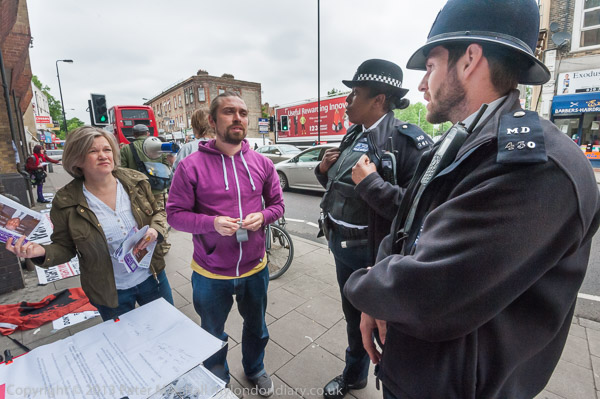 Police
harass protesters to remove posters from Jobcentre wall
Police
harass protesters to remove posters from Jobcentre wall
more pictures
Protesters at Peckham Jobcentre demand to known why this jobcentre ia sanctioning (taking away) the benefits of jobseekers at twice the rate of any other job centre in London. 5,174 ISA sanctions in Oct 2012-Dec 2013 made 345 destitute each month.
Protesters at Peckham Job Centre Plus in south London asked the managers in vain to explain why they withdraw benefits from twice as many people as the average job centre in London. Sanctioning in this way leaves many job seekers destitute, without any source of income, often for three months, removing the 'safety net' the welfare state is supposed to provide.
Often the reasons for imposing sanctions are outside the control of the person who suffers; many are a result of bureaucratic delays or inefficiencies by the job centre concerned. People also get sanctioned for refusing to undertake long periods of unpaid work without pay - doing jobs where they replace paid staff in shops and elsewhere as a part of unfair 'workfare' schemes.
Around a dozen people arrived and set up stalls in front of the job centre, fixing posters on the pavement and the outside wall of the building. They used a megaphone to tell people why they were protesting and handed out leaflets, including those giving information about UKBA raids.
At one point two police officers came to look at the stall, before going in to the job centre to talk to staff there. They came out to pass on a request that the protesters remove posters they had stuck on the outside of the building. The protesters replied that the staff could come outside and take them down or otherwise they would be removed at end of the protest.
The police argued for some time, but were unable to name any offence that
was being committed and eventually went back inside to talk to the staff again.
They were still inside when I had to leave.
more pictures
Solidarity with Ukrainian Miners
Holborn, London. Fri 23 May 2014
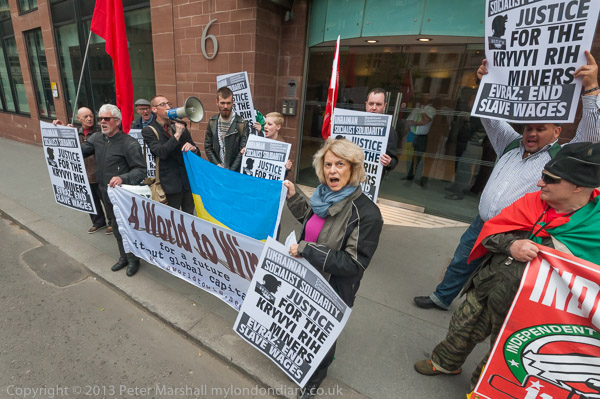 Ukrainian
Socialist Solidarity and IWGB protested outside the offices
Ukrainian
Socialist Solidarity and IWGB protested outside the offices
more pictures
A protest at the registered offices of London mining company Evraz, owned by Russian Oligarchs Roman Abramov and Alexander Abramovitch, supported miners in the Independent Union of Miners of Ukraine who have ensured peace and unity at Kryviy Rih and are striking to maintain real wages.
Kryviy Rih is a city in south-east Ukraine, around 400km from Kiev, at the centre of the largest steel industry in Eastern Europe with a population of around three-quarters of a million people.
It hasn't featured a great deal in the news from Ukraine, although a month ago there was a rally of a couple of thousand people carrying Ukrainian flags with banners 'Kryvyi Rih is my city' and shouting "Putin, get out!”. Miners' brigades were organised to control protests and defend the Maidan while preventing the situation in the city to get out of control.
The unrest and devaluation in Ukraine has caused a rapid rise in the cost of living with a fall in real wages of around 30-50%. The workers in the province had been promised a rise of 20% in April but it was not paid - instead they got what they describe as "an insulting handout" of between £25 and £58.
The Independent Union of Miners of Ukraine has demanded an immediate doubling of the real wage "in the interests of preserving social peace in this country." They go on to say: "We are deeply convinced that the main cause of the destabilised situation in the country is the greed of Ukrainian and Russian oligarchs, who pay a beggar’s wage to workers, send all their profits off-shore and don’t pay taxes in Ukraine. In fact the oligarchs are almost completely exempt from taxes on their profits."
On 11th May, the miners marched through the streets of Kryvyy Rih to the offices of the mining company EVRAZ "and showered its office with loose change as a sign of protest against the fictitious 'wage increase' for April."
The Independent Union of Miners of Ukraine called upon the British public to picket the offices of EVRAZ plc and the offices of other Russian and Ukrainian oligarchs’ corporations in London and other cities in Europe, and in response to this a protest was held outside the registered office of the company in the City of London.
The majority share of the vast multinational EVRAZ empire is owned by Russian Oligarch Roman Abramovich, along with his business partner Alexander Abramov who built up the business. But like many multinationals, its actual business is somewhat opaque, and as the police who turned up to talk to the protesters confirmed, its London address is simply that of a firm providing accounting, tax, Human Resources and payroll services to businesses.
The protesters stood outside the offices with placards declaring their solidarity with the Kryviy Rih miners and shouting slogans including "Western Banks, Russian Tanks, Hands off Ukraine."
As well as calling for protests, the miners have also asked for information and humanitarian support, as well as appealing for personal protective clothing for the workers self-defence brigades and mobile radio communications equipment.
A further protest is planned for June 12 outside the Chelsea Football ground,
another enterprise owned by Roman Abramovitch. There might also be an opportunity
for protests at the EVRAZ Investor Day, on Wednesday, 11 June 2014 at the
Grange City Hotel, 8-14 Cooper's Row, London, EC3N 2BQ, where company chair
Alexander Abramov is due to attend.
more pictures
Support Hunger Strike in Israeli Jails
G4S HQ, Victoria St, London. Fri 23 May 2014
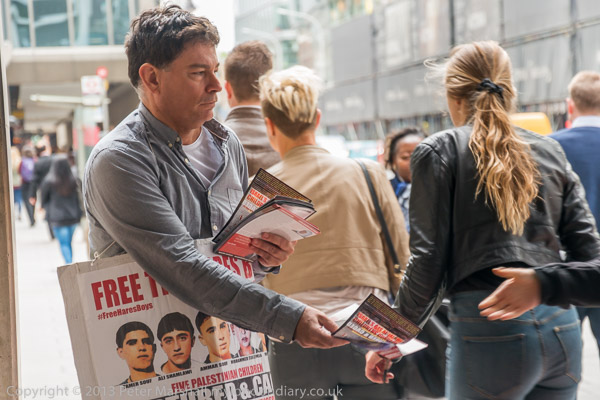 Protester
hands out leaflets supporting Palestinians on hunger strike
Protester
hands out leaflets supporting Palestinians on hunger strike
more pictures
Protesters at the London HQ of G4S supported the mass hunger strike by Palestinians demanding an end to Israels’s illegal policy of rolling Administrative Detention which can jail them for years without charge or trial in prisons which G4S secures.
A mass hunger strike by Palestinian prisoners demanding an end to Israel's illegal policy of punitive Administrative Detention began on 24th April this year, with 134 administrative detainees taking part.
Israel uses administrative detention to imprison Palestinians indefinitely without charge or trial, using rolling detention orders of 1-6 months which are renewable indefinitely in defiance of international law. The orders are based on "secret information" which never needs to be produced to the detainee nor their lawyer and are used to arbitrarily jail Palestinians where there is no evidence for a trial. 9 Palestinian MPs have been given detention orders as a punishment.
In recent years, there have been an average of 2000 detention orders each year. Of the 186 currently in jail, 160 are held in G4S secured prisons including Ofer, Ketziot and Megiddo. Most have been transferred from the West Bank into Israel in contravention of Article 76 of the Fourth Geneva Convention.
Now 34 years old, Ayman Al-Tabeesh has spent over 10 years in Israeli prisons. After being held under an administrative detention order in Spring 2013 he protested against his imprisonment with a 105 day hunger strike, only stopping when he was given a written promise that his administrative detention would not be renewed. But it was renewed in January 2014, and he began a second hunger strike on 28th Feb 2014. 70 days later he was in a critical condition, having lost over 25kg in weight, and now after 85 days doctors tell him he is at grave risk of a heart attack if he continues his hunger strike.
A small group of protesters set up banners and handed out leaflets on the busy Victoria St outside the London headquarters offices of G4S while a loudspeaker played Palestinian music. Although some hurried by, quite a few of those passing took the leaflets, and some stopped to read and discuss them. Most expressed their concern over Palestine but there was one young man who stopped to argue, calling the Palestinians who were in prison "terrorists".
People were arriving slowly to join the protest when I had to leave after around half an hour. Later the was to be a statement relayed from the Muhammed Al-Tabeesh, the brother of hunger striker Ayman Al-Tabeesh, who had himself been a hunger striker but was released from prison four months ago. He wrote to express his thanks for the London protest outside G4S two weeks ago:
"Thank you for standing besides us in supporting the steadfastness of my brother Ayman Al-Tabeesh in his hunger strike.
"Thank you for your humanity in supporting the Palestinian prisoners, especially the hunger strikers.
"We need you to tell the international community of Israel’s criminal brutality against our prisoners, the violation of their rights. The occupations illegal never ending administrative detention orders is nothing less than a slow death for Palestinian prisoners."
Oromo and Ogaden against Ethiopian killings
Old Palace Yard, Westminster, London, Fri 23 May 2014
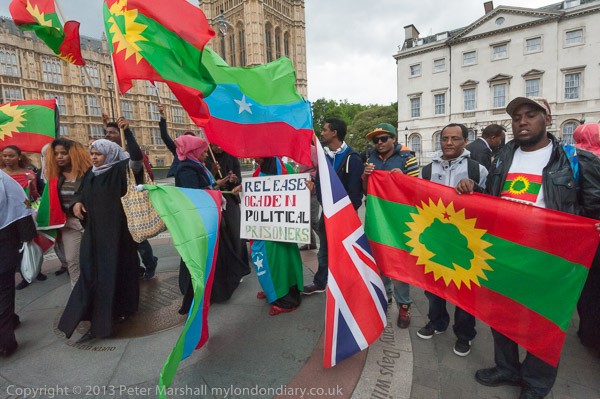
The protesters had put down most of their banners by
the time I arrived and were waving their flags
more pictures
Oromo and Ogaden National Liberation Front supporters protested at Parliament over the Ethiopian government's killing of Oromo university students peacefully protesting the grabbing of Oromo land and calling for the release of political prisoners.
Around 30 million Oromo people live in present day Ethiopia and adjoining areas of Kenya and Somalia, the largest ethnic group in Ethiopia, and their Oromo language is Africa's third most widely spoken.
They are an ancient civilisation with a highly developed democratic form of governance, Gadaa, and there were a number of Oromo kingdoms co-existing in the region. They were conquered in the late nineteenth century by Abyssinian emperor Menlik II, aided by the European colonial powers and their modern weapons. Around half the Oromo are said to have died during the period of the wars, with mass killings by the Ethiopian Army, mutilations and slavery on a large scale. Successive regimes made determined attempts to destroy Oromo identity - its language, culture, customs and tradition.
The Oromo Liberation Front (OLF) was founded in 1973, shortly before the fall of Emperor Haile Selassassie but the new military goverment continued the suppression of the Oromo, and initiated mass resettlements from Northern Ethiopia onto Oromo lands and moved millions of Oromo into camps run by the military. After the fall of the communist Derg regime, in which the OLF took part, the new Ethiopian state continued to imprison and kill Oroma - estimates suggest over 50,000 in the first ten years. Following September 11, the US worked together with the Ethiopian in an alliance against "terrorism", and in 2011 BBC Newsnight and and the Bureau of Investigative Journalism exposed how the the Ethopian goverment was "using billions of dollars of development aid as a tool for political oppression" with programmes of deliberate starvation of communities, and "of mass detentions, (and) the widespread use of torture and extra-judicial killings."
The protest in London today by supporters of the OLF and the Ogaden National Liberation Front (ONLF) was to raise public awareness about the continuing situation in Ethiopia, and in particualr about the crackdown since the start of May with mass killing of Oromo University students and other innocent civilians. The students were peacefully protesting about the illegal forcible evictions of Oromo farmers from their ancestral lands around Addis Ababa under the governments Addis Ababa Integrated Master Plan. This will result in the eviction of millions of Oromo farmers and their land being given to government supporters or sold to foreign investors.
The OLF are calling on the Ethiopian government to stop killing Orormos and release the many held as political prisoners as well as respecting the land rights of the Oromo in accord with UN provisions. They want the international communisty to condemn the human rights abuses and atrocities, and for UN, EU and humanitarian organizations operating in Ethiopia to closely monitor the political and military action against innocent civilians in the region.
The protest was coming to an end when I arrived, with the placards in a heap
while people were taking photographs outside the Houses of Parliament.
more pictures
Defend UoL Garden Halls workers
Senate House, London. Fri 23 May 2014
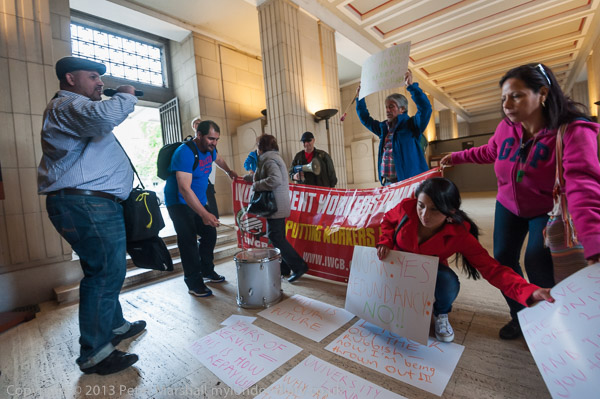 IWGB
protesters set up in front of the main door to Senate House
IWGB
protesters set up in front of the main door to Senate House
more pictures
A further protest by the IWGB union defending the rights of 80 workers being made redundant at the University of London's Garden Halls took place at Senate House. The union is demanding proper consultation and negotiation over the redundancies.
The workers to be made redundant include caterers, porters, cleaners and security guards and includde many of those who are active in the continuing struggle for proper sick pay, holidays and pensions in the '3 Cosas' campaign at London University.
Many are members of the independent union, the Independent Workers of Great Britain, which the University and its contract employers Cofely refuse to recognise. They prefer to talk to the more compliant traditional unions, even though these have few if any members among the workers. Cofely's response has been to send a threatening letter full of apparently false accusations to the IWGB; the IWGB have published their reply refutating these.
The IWGB has also asked supporters send London University Vice-Chancellor Professor Sir Adrian Smith letters backing their demands.
- a guarantee of no compulsory redundancies
- length of service be respected
- full and meaningful consultation with the IWGB
- the same wage levels for any workers transferred to contracts outside the UoL
- the same terms and conditions for any transferred workers.
The union says: "many of these workers have been at the University of London for decades" and "the University bears responsibility for the treatment of these workers, regardless of the fact that their roles are contracted to private companies."
Around 30 union members and supporters met at Senate House at lunchtime for a noisy protest, which they intend to repeat every Friday until the end of term or until management engages in meaningful talks over the issues. After a short noisy protest with megaphone, drums, whistles and shouting in the covered area at the bottom of the building in front of the main door they marched on the streets around the building before returning to the main door.
Many of those entering the Senate House took their leaflets and expressed support for the workers, but as they were going around the streets, one irate young woman ran up and shouted at them that they were disturbing her revision - and was told that it would only be a short protest and was about an vital issue for those concerned.
Towards the end of the protest they were approached by a member of staff from one college who requested that they finish by 2pm so as exams were starting then; the protesters assured here that they intended to do so, having planned to protest not to interfere with the examinations, while reminding the University management that they needed to act reasonably and talk with the union about the redundancies.
As usual the protest ended with the loudly chanted reminder "We'll
be back, and that's a fact!"
more pictures
Obama keep your promises
Trafalgar Square, London. Fri 23 May 2014
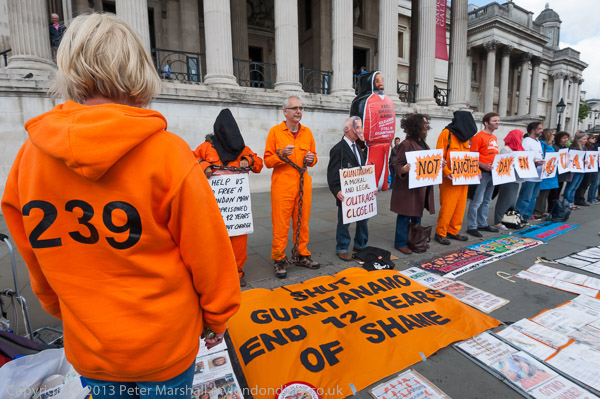
Obama free prisoner 239 - Londoner Shaker Aamer and
keep your promise to shut Guantanamo!
more pictures
A year after President Obama again pledged to close Guantánamo, activists in black hoods and orange jumpsuits in London and 40 other cities reminded him of yet another broken promise and called for the urgent release of Londoner Shaker Aamer.
When media attention fell on the ongoing hunger strike by prisoners in at Guantánamo Bay last May, Barack Obama made yet another promise to close it down. In the year since then only 12 prisoners have been released and 154 remain, subjected to appalling conditions, beatings and daily abuse of their human rights.
Almost all of those still incarcerated have been held now for 12 years without charge or trial, and many like former London resident Shaker Aamer have been cleared more than once for release. His family in Battersea include one son who has never met his father, born a few months after his capture by bandits in Afghanistan.
Today's protest in Trafalgar Square was part of an international day of action coordinated by the US organisation Witness Against Torture, with protests in 40 cities in three continents calling for the release of the prisoners, the closure of Guantanamo and other similar prisons and an end to the practice of extraordinary rendition.
Activists, some dressed in orange jumpsuits, brought a giant inflatable figure of Shaker Aamer to Trafalgar Square to draw attention to his case. They did so with the backing of Aamer himself, expressed through his lawyer, and using for his face the photograph he had asked to be used.
They also brought a series of large printed posters which they held in line at the top of the square in front of the National Gallery to read "Not Another Day in GUANTANAMO", along with other posters and banners.
Aisha Maniar, a spokesperson for the London Guantánamo Campaign, stated:
"In over five years as US president, Barack Obama has failed to deliver a change we can believe in on Guantánamo Bay. Twelve years of indefinite detention almost wholly without charge or trial for 154 prisoners has made the world an infinitely more insecure, dangerous, and lawless place. Closing Guantánamo has long been a question of when as opposed to how.
"A prisoner hunger strike ongoing more than 15 months later, in addition to his failure to transfer any Yemeni prisoners - who make up the largest nationality and the majority of those cleared for release, following the lifting of a moratorium - signal that Obama’s words remain purely rhetorical. There is little intention to close Guantánamo Bay and the legal black hole it has created."
Cyclists protest Death at the Elephant
Elephant & Castle, London. Wed 21 May 2014
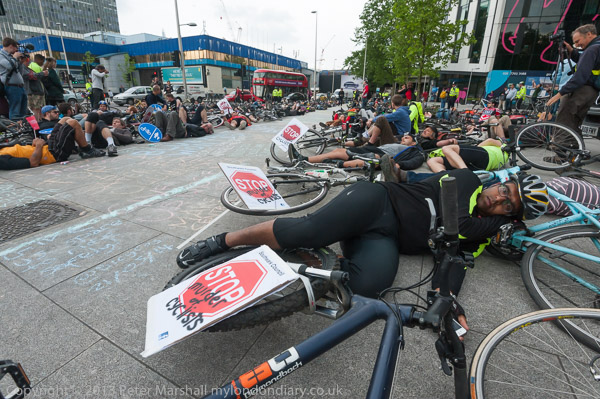
Campaigners take part in a die-in along the cycle bypass
they say would save lives
more pictures
Several hundred cyclists held a chalk and die-in protest at London's Elephant and Castle where yet another cyclist was killed by an HGV last week calling for urgent action to make roads safe for cyclists.
The protest was organised following the death of 47 year-old Abdelkhars Lahyani on May 13, killed at the junction with Newington Butts by a HGV, whose driver was arrested on suspicion of causing death by careless driving. Lahyani's son was present at the event and passed on his thanks to those who had come to remember his father and try to prevent more similar tragedies.
The safe cycling organisers who spoke at the event say it would be wrong to call his death an accident; Donnachadh McCarthy described it as "a designed-in killing", criticising Southwark Council, the Greater London Authority and the government for their failures to implement the measures needed to improve cycle safety. Cyclists say that we should be putting a similar amount of money and expertise into cycling safety as they do in Holland.
McCarthy quoted from Southwark Council's transport plan which argues against segregation of cyclists and says that including them in traffic is useful to slow traffic flows; it may, but at the expense of regarding them as expendable.
The traffic system at the Elephant & Castle, one of south London's busiest and more complex junctions, was redesigned a few years ago at a cost of £3 million, but the changes made had not made proper provision for cyclists. The protesters marked out a 'bypass lane' across a wide area of pavement which would have avoided the killing and called for emergency crews to make this permanent as soon as possible.
The marked cycle lane was soon filled with chalk messages about cycle safety, and the protesters put down their bikes on the pavement on either side. After an announcement from McCarthy they then staged a die-in, lying on the pavement in silence in the middle of the bikes for around ten minutes, leaving the lane with its chalking as a 'sacred space' in memory of the killed cyclist.
At the rally which followed, co-organiser Steve Routley read out the names of the cyclists killed in London - there were 14 in 2013 and six so far this year. Abby Taubin then read one of several poems by Seamus Heaney which arose from his feelings over the loss of his younger brother, killed in a road accident when the poet was still a schoolboy.
We were then read a speech written this week in hospital by Bart Chan, who had a very close escape from death on the same day as Lahyani, when a HGV drove over him in Upper Thames St. Despite going under the whole length of the vehicle from front to back he emerged alive, though with considerable injuries. He pointed out that banning HGVs from city streets during the rush hours (as is done in some other countries) would be a 'Magic Wand' reform, with immediate improvement in safety for cyclists and pedestrians. Along with others at the protest he also called for much greater urgency over improvement in lorry design to give drivers the all-round view that is essential for safety.
The final speech was by Donnachadh McCarthy, who set out very clearly the failures that were leading to the deaths of cyclists, and also thanked the police for their cooperation in the event. At the end of his speech he talked about the great advantages of cycling for personal health and for the environment: "Cycling is a gift: cleaner planet; safer lives." But only if we make our cities safe to cycle in. As he pointed out as well as the roughly 60 cyclists and 300 pedestrians killed in London traffic accidents since the last election, an estimated 13,000 had died before their time because of traffic pollution.
Green Party London Assembly member Jenny Jones, now a Life Peer
as Baroness of Moulsecoomb and a consistent long-term campaigner for cycling
in London - and someone who whenever possible cycles herself was one of those
taking part in the protest. As I left, McCarthy was having a long discussion
with Liberal Democrat MP for Bermondsey and Old Southwark Simon Hughes
who had arrived during the rally.
more pictures
Turks protest Soma mine deaths
Turkish Embassy, London. Tue 20 May 2014
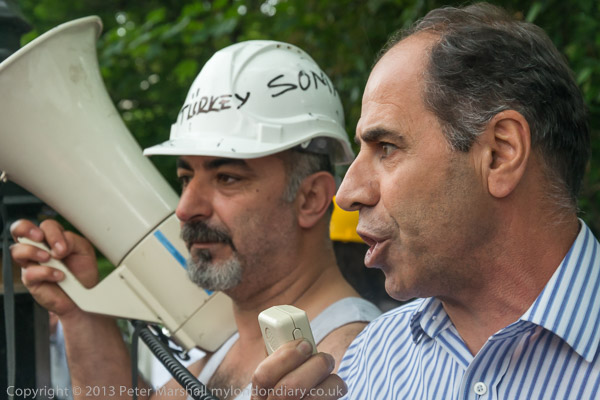
more pictures
A protest, mainly by London's Turks and Kurds, at the Turkish embassy laid blame on the Erdogan government's failure to enforce health and safety regulations and the employer's greed for the recent death of over 300 miners in the Soma mine disaster.
One black banner with large white letters expressed clearly their view: 'Soma Is Not Destiny It Is A Massacre!' and those who spoke emphasized the terrible record on health and safety in Turkey in all areas of industry.
They said that the Turkish state has "a black history with regards to work health and safety" and the ILO ranked Turkey as the country with the third highest number of workplace fatalities in the world. Despite having been a member of the ILO since 1932, Turkey has refused to sign the ILO conventions on miners' safety and working conditions, including Convention 176, introduced in 1995 with the aim of protecting mine workers from injury and the environment from mining-related damage. More than 11,000 Turks have died in workplace incidents in the last decade, and deaths per tonne of coal mined there are over 5 times as high as in China and a staggering 180 times those in the USA.
The protesters say that even those regulations that do exist are not enforced, and that the situation has got worse since privatisation - or as the protesters put it "selling all state property to (their) own gang" - the Soma mine was privatised in 2005. Observers claim the the drastic reduction in production costs to around one fifth of its previous amount is entirely due to the removal of safe working standards and the introduction of unsafe practices.
At Soma one aspect of this as been the extension of the tunnels from 350 metres to over 2.5 kilometres from the lift shaft. The Turkish body responsible for safety inspection was disbanded by the government in 2011, and there are now no on-site inspections - just brief visits by officials the the mine company headquarters. Despite this, the Ministry of Work and Social Safety rapidly issued a statement saying "The last health and safety inspections were made in March" when "there were no discrepancies found according to the regulations." Workers in privately owned workplaces are now over 2.5 times as likely to die at work than those in state concerns.
The protesters stood on the edge of the pavement opposite the embassy for around an hour of speeches and chanting, waving flags and holding banners and placards. Some wore hard hats, and the name of the mine, SOMA, was spelled out in front of the protest in nightlights alongside a small pile of coal. A popular placard showed a an image of coal with the message Devlet Katletti ('Killed by the State) and another in Turkish stated 'No Accident - Massacre.) Others were in English, calling for the prosecution of the government and the mine owners and for the release of the jailed Turkish protesters and lawyers who have supported them. Many of them were from the Worker-Communist Party of Iran - Hekmatist who earlier sent a message of deepest sympathy to "Comrade workers, families of the workers in Soma mine, and people of Turkey!" and in support of the "protests, strikes and struggles which the workers, trade unions and the people of Turkey have started and have rightly pointed their fingers at the real culprits. The culprits of this tragedy, the owners of the mine and the government must be prosecuted."
After around an hour, a red rose and a large black wreath were carried across the road and left in the doorway of the embassy, where they remained when I left at the end of the protest. After this there were some final speeches and a minute of silence for the dead. The official death toll is 301, but the actual figure is thought to be higher as there were not accurate records of who was working in the mine.
Christian Aid Circle the City
City of London. Sun 18 May 2014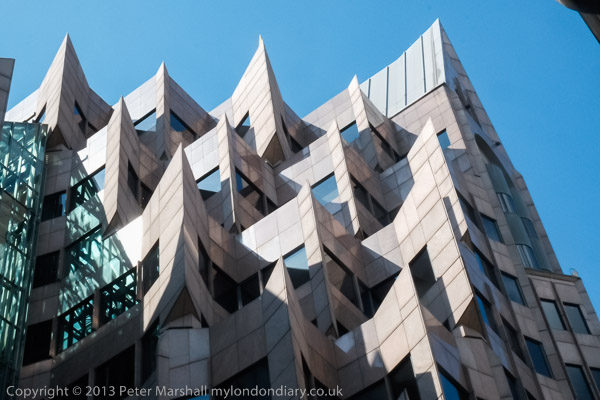
Not a church but one of my favourite city buildings
more pictures
Walk the City is an annual sponsored walk to raise money for Christian Aid. As usual my wife was taking part along with a small group from her church and I went with them for company or to stop them getting lost.
It's a good way to get to see inside a lot of the City churches although
most are usually open during daytime on weekdays as well as for services and
some have free lunchtime concerts. One novel feature of this year's walk was
that it included Bevis Marks synagogue, though unfortunately photography is
not allowed inside. And because we had a whole long list of churches to visit
it wasn't possible to stay long in each of them.
more pictures
Lambeth College March for Further Education
Clapham Common to Brixton, London. Sat 17 May 2014
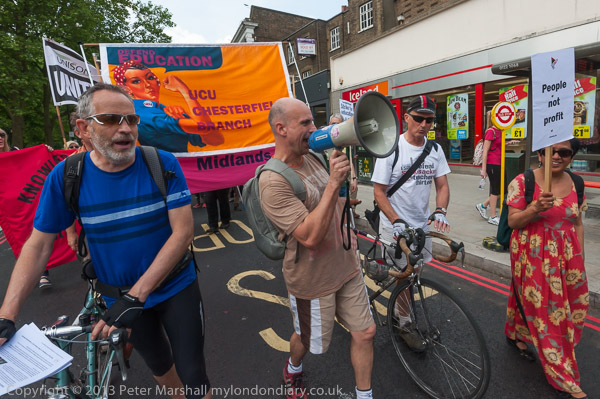 People
came from F E colleges across the country to join the Lambeth college marchers
People
came from F E colleges across the country to join the Lambeth college marchers
more pictures
Lambeth college workers and supporters from around the country marched to a rally in Brixton to defend FE against cuts and privatisation by college management, which is trying to slash terms and conditions and attacking the right to strike.
The management of Lambeth College in inner-city south London have launched plans to 'restructure' the college, selling off most of it Brixton campus to allow a so-called 'free school' to be set off, and attacking the pay and conditions of the academic and service staff. The management want to cut the pay of staff, to increase the number of working hours and to cut holiday and sickness benefits, and have set out to break the power of the two unions, the lecturers union UCU and Unison to which the service workers belong, at the College.
There is no need for the extra places a free school would provide in the local area, and if for no other reason the views of the chair of governors of the 'Trinity Free School', Dennis Sewell on Darwin and evolution should disqualify him from any role in education in the UK - and some of his other views expressed in the right-wing press are also deeply worrying. Despite being a "non-selective school with a Catholic ethos", the Roman Catholic Diocese have not offered their support for the scheme which will have a negative impact on existing Catholic secondaries in the area. Lambeth's cabinet member for children and families Rachel Heywood has made it quite clear that Lambeth already has enough secondary places and told the Brixton Blog "had we been consulted we would have said that we did not need another secondary school in Brixton as we already have a variety of good schools with space."
The march was also about protecting the right to strike, and the College management recently spent tens of thousands of pounds in getting an injunction against the UCU using anti-trade union laws after a 95% vote for a strike in a ballot with a 70% turnout. The UCU is re-balloting and will almost certainly get greater support second time round. Despite the injunction, and a letter from UCU general secretary Sally Hunt stating "all members will be required to return and work normally tomorrow. Failure to do so would mean that you are liable to be dismissed and you would have no claim for being unfairly dismissed" there was a second one-day strike on May 1, and further action is expected.
Although the local Unison branch is reported to have unanimously asked for an indefinite strike at mass meetings, Unison nationally appears not to be entirely supportive of its members desire to fight. They forced the members at Lambeth to have a time-wasting and bureaucratic ballot about whether they wanted a ballot
The altered contracts which will initially affect all new staff, staff who are promoted or who change their fractional hours and all current hourly paid staff (and the management intends to impose on all existing staff) include increased working hours including an extra hour per week of contact time, an extended working week, a cut of 2 weeks in annual leave, additional duties with no extra remuneration, a link between pay increments and capability, reduced notice of redundancy and a drastic reduction in sick pay.
The UCU realise that the action of the Lambeth College management is not just a local issue but that if the management can get away with these changes here, they will also be brought in by other colleges, and has declared the Lambeth dispute to be one of "national significance".
Over 200 trade unionists, including representatives from colleges across London and from the Midlands brought banners to Clapham Common for a march in solidarity with the workers at Lambeth College. There were a few short addresses as the marchers arrived, with those from various organisations expressing their support.
As the march went through the busy streets of Clapham, Stockwell and Brixton, people stopped to watch and responded to requests to cheer and for motorists to sound their horns in support. Almost everyone seemed keen to take the flyers, postcards and leaflets being handed out, though there were just one or two people I heard telling a leafleter that teaching was an easy number. "Have you ever tried it?" was the response, and the answer of course was negative.
Waiting at Windrush Square for the march to arrive was an open-top bus from which the speeches were made, including a number of speakers from Lambeth college and other Unison and UCU branches. Ian Hodson, the general secretary of the Baker's union BFAWU, gave a stirring address, telling the story of the Hovis dispute, where by standing together and fighting for their rights, the members had won the fight not just for themselves but also for agency workers who had been brought in to replace striking workers. Another fine speech came from Labour MP John McDonnell, who made the point that employers were attempting to destroy the unions and impose a new form of feudalism - which needs a new form of unionism to oppose it.
As well as the Lambeth College workers, there were several other groups who
have already led the way in this new militant grass-roots trade unionism.
In the audience were those from Tower Hamlets College who fought
their management and won recently, as well as supporters of the '3 Cosas'
campaign for low paid workers at the University of London from the IWGB. And
a local group who marched and spoke, workers from the Ritzy cinema,
a few yards from where the rally was taking place, members of BECTU, who have
enjoyed great local backing for the series of strike they began last month
to be paid the London Living Wage.
more pictures
Garden Halls Closure Senate House Protest
University of London. Fri 16 May 2014
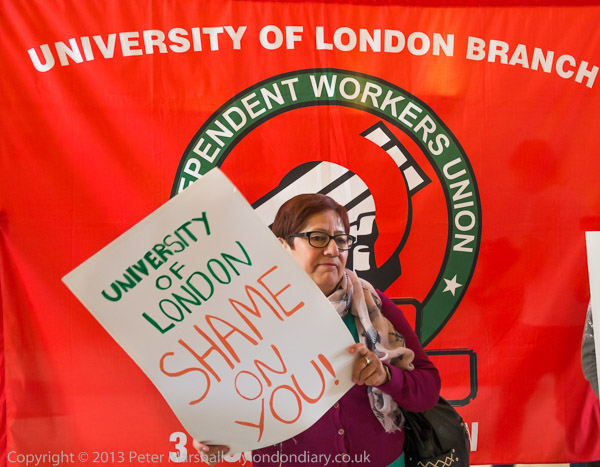 A
protester with placard 'University of London Shame on You!' in front of the
IWGB banner
A
protester with placard 'University of London Shame on You!' in front of the
IWGB banner
more pictures
London University has announced the closure of the 3 Garden Halls of residence, making over 80 workers redundant from June 30. They have refused to consult properly with the cleaners union, the IWGB, and today was the third protest against the cuts.
Among the workers to be made redundant are caterers, porters, cleaners and security guards; the cleaners at the Garden Halls were among those at the forefront of the London Living Wage campaign and are active in the continuing struggle for proper sick pay, holidays and pensions in the '3 Cosas' campaign.
The majority of the affected workers who are in unions, including 27 cleaners and cleaner supervisors, belong to the Independent Workers of Great Britain, but the University and the contract employers who provide the labour here and in other workplaces for the University have refused to recognise the IWGB. They prefer to talk to the more compliant traditional unions. Although some of the workers used to belong to these, at many workplaces they left after seeing that these were unwilling to stand up to the employers on their behalf, and formed their own active independent grass roots union, the IWGB.
In a letter the IWGB requests supporters send to London University Vice-Chancellor Professor Sir Adrian Smith, the workers' union demands are clearly listed:
- a guarantee of no compulsory redundancies
- length of service be respected
- full and meaningful consultation with the IWGB
- the same wage levels for any workers transferred to contracts outside the UoL
- the same terms and conditions for any transferred workers.
As the letter says, "many of these workers have been at the University of London for decades" and "the University bears responsibility for the treatment of these workers, regardless of the fact that their roles are contracted to private companies."
It is a scandal too that the University is prepared to hide, along with the contract employers Cofely and Aramark, behind the deliberately evasive provisions of the law on trade union recognition rather than recognise the rights of the workers to proper recognition. It should be recognising the union its workers have chosen to represent them, and insisting that Cofely and Aramark also do so.
Around 30 protesters gathered at lunchtime outside the main entrance at the base of Senate House, making a considerable amount of noise with a few drums and whistles, handing out leaflets to those going in and out and displaying banners. After around 40 minutes they were joined by the President of the IWGB, Alberto Durango, and after a further few minutes of protest there he led them out to walk around the building.
The doors on the south side of Senate House in Montague Place were quickly closed as the protesters approached, but around the corner in Russell Square, the doors to Stewart House, part of the university estate connecting with Senate House were open, and around half of the protesters walked in.
They wandered around the corridors and stairways of Stewart House for a few minutes, still banging drums and carrying banners and making their presence felt before leaving by a side entrance into the Senate House car park.
There, as usual, their noisy protest ended with the a clear message to the
University of London, 'We'll be back!' Yesterday the IWGB served
notice of ballots for industrial action to both Cofely and Aramark over the
redundancies at the Garden Halls. Voting will begin in one week.
more pictures
Communists & Anti-Fascists protest Ukraine Massacres
Ukrainian Embassy, Holland Park, London. Wed 14 May 2014
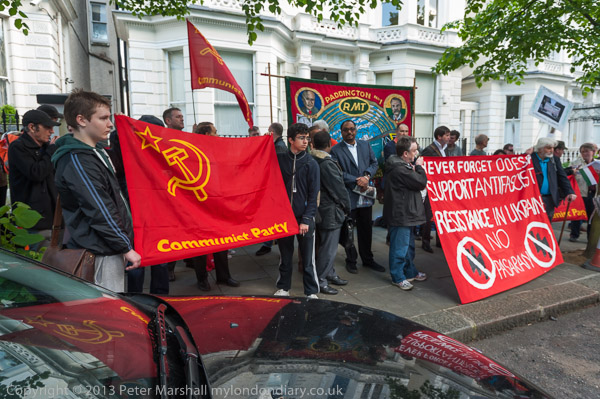
Protesters with banners, flags and placards opposite
the embassy
more pictures
Communists and Ant-Fascists protested together in a protest organised by the Young Communist League at the Ukraine Embassy calling on the neo-Nazi junta in Kiev step down and against the massacres of trade unionists in Odessa and elsewhere.
Almost 50 people had turned up for the protest by the time I left, from a number of communist and anti-fascist groups. The YCL listed six reasons they had called the demonstration, to:
- Condemn the recent massacre of trade-unionists in Odessa.
- Condemn the expulsion of the Communist Party of Ukraine from Parliament
- Call for the embassy staff to refuse to obey orders or diktat from the Neo-Nazi junta installed in Kiev.
- Demand Britain cuts all diplomatic ties with the junta.
- Demand an end to the assault on Ukrainian workers and progressives and that the openly Fascist, anti-democratic coup government steps down.
- Express solidarity with the Communist Party of Ukraine, communist youth and all anti-fascists in Ukraine."
Some of those present were worried that the protest might attract the attention of fascist groups, and were advising those they spoke to to leave the protest in groups rather than singly. But there was absolutely no evidence that this was the case, and previous protests I've attended in support of the ousting of the former Ukrainian regime by the protests in Kiev have had no support from the British ultra-right. Most of those taking part have appeared to be middle-class Ukrainians with liberal views who want their country to remain united and free from Russian control.
One young Ukrainian woman who has lived in the UK for some years did come
to talk to the protesters, and argued that their view of situation in Ukraine
was simplistic and bore little relation to reality. It is hard for those of
us not there and reliant on the various media sources - including both Russian
and western media - to be sure what is really happening, but there does seem
to be no shortage of evidence of atrocities by both pro and anti-Kiev groups.
The protesters chanted loudly:
"Remember Odessa, Down with the fascist junta" and "No
more fascist massacres" referring to the events of May 2 when 42
people were killed and over 200 injured as nationalists burnt their protest
camp and set fire to Trade Unions House, trapping many activists inside. Placards
told the story of one of them, Andrew Brazhevsky, who fled there after the
camp was attacked and burnt. Like most of the others who died, he escaped
from the burning building alive, jumping out of an upper floor, but then "The
neo-Nazi beasts finished him off with bats as he lay at their feet."
Doubtless many of the other 42 deaths were similar.
There was a small jarring aspect of the chant which threatened to disrupt
the unusual unity of the various groups protesting. Those leading the protest
ignored the Spanish pronunciation of the word 'junta' widely used on the left
after the word came into common use during the Spanish Civil War, along with
the phrase 'no pasaran', made famous by 'La Pasionaria', which was on most
of the placards at this protest.
more pictures
Travellers protest Spectator's racist language
Old Queen Street, London. Wed 14 May 2014
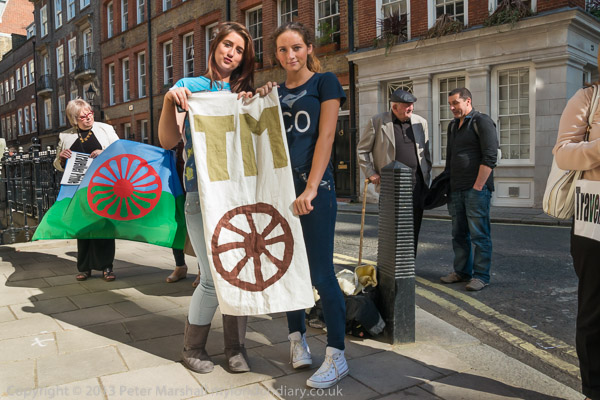
Roma flag and Traveller Movement banner outside the Spectator offices
more pictures
A deputation from the Traveller Movement protested at The Spectator offices in Westminster handing a petition to the editor after an article in the magazine suggested that it was acceptable to use racist names for Roma, Gypsies & Travellers.
The article that caused considerable offence in the Traveller community for was by Rod Little, and contained the phrase "It still seems to me that ‘gyppo’ and ‘pikey’ are useful means of lumping them all together". It led to a petition by the Traveller Movement (formerly the Irish Travellers Movement in Britain) to Spectator editor Fraser Nelson asking for his "help to stamp out racism against the UK’s and Europe's Gypsy, Irish Traveller, Roma and other Traveller populations who are often the target of negative press coverage."
The petition further states that Liddle's use of offensive terms is "the equivalent of using the highly offensive n-word to describe ethnic minority black groups." and they ask "for the Spectator to make a public apology for giving a platform for racism and to give a right to reply to Rod Liddle’s article."
Liddle's article seems to have been written largely with the intent of causing offence to the communities concerned and squeezing the maximum innuendo into the minimum regard for the facts of the case he was allegedly discussing, that of 'Maria', a blonde young girl whose Roma mother had placed in the care of Christos Salis and Eleftheria Dimopoulou as she lacked the funds to look after her. The couple were for some weeks the target of a xenophobic campaign by media around the world after Greek authorities wrongly accused the couple of abducting her, an incident which prompted similar actions by authorities and vigilantes elsewhere in Europe with Roma children with light skin and blue eyes being taken (and later returned) from their families.
But why on earth should Liddle think he is in a position to pontificate on the subject of the proper terms to use for any minority? The NUJ has some guidelines on fair and accurate reporting of race relations subjects which includes the advice: "Think carefully about the words you use. Words which were once in common usage are now considered offensive... Ask people how they define themselves."
I walked to the Spectator offices with a group of around a dozen people from the Traveller Movement, and others joined us later on the pavement outside the offices in Old Queen St. It was a quiet protest, with people holding a Roma flag and the ITMB banner, sometimes folding it to present just their new initials, TM.
The protest was joined by two policemen, but they were not in uniform, just some of the growing number of officers from the traveller community, but it required no policing. Present along with staff from the Traveller Movement was also Rainer Schulze, Professor of Modern European History at the University of Essex and founding editor of the journal 'The Holocaust in History and Memory.'
There was much serious discussion on the pavement about the various threats faced by travellers with two particular changes in UK law causing problems for them. One is the regulations requiring Driver Certificate of Professional Competence for those driving lorries of 3.5 tonnes or more, with both theory and practical tests. For those with horses, a more serious threat is of a law against 'fly-grazing' which would make it illegal for horses travelling around the country to graze at the roadside or on common land. Already brought in in Wales, so far Defra has resisted legislation for England. Although there are real problems of cruelty that animal welfare charities press to be addressed, the law would extinguish ancient rights and almost certainly lead to an end to our traditional horse fairs.
After the protesters had been outside the offices for around a quarter of an hour, Spectator editor Fraser Nelson came out to greet them carrying a plate of chocolate cake. It was his birthday he told them, and there was more cake than they could eat in the office and would they like some. Several took up his offer, including myself, and as I told him, it was my own birthday too, though I was a little older. The cake was excellent, though several of the travellers would not take any on principle; as a journalist I had no such scruples.
At 5pm Traveller Movement Communications Officer Mike Doherty and
a couple of others rang on the bell and went inside to deliver the petition
to Fraser Nelson. Around half of those present then posed outside the door
for a photography before going on to a Parliamentary seminar organised by
the Traveller Movement in partnership with the Travellers’ Times and
hosted by the All Party Parliamentary Group for Gypsies Roma and Travellers
to scrutinize and challenge media portrayals of Gypsies, Roma and Travellers.
more pictures
Save Independent Living Fund
Dept of Work & Pensions, London. Mon 12 May 2014
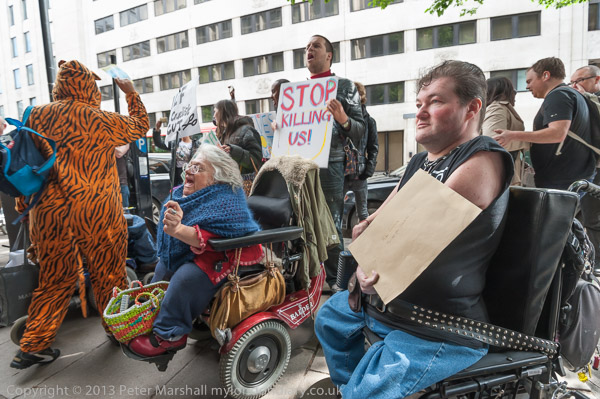
Disabled protesters and supporters outside the DWP in
Caxton St
more pictures
Disabled activists and supporters protested at the Dept of Work & Pensions against plans to end the Independent Living Fund, cutting support to the disabled, forcing them to be imprisoned in care homes rather than continuing to live independently.
The Independent Living Fund (ILF) helps over 18,000 disabled people who have high support needs to live an independent life in the community rather than live in residential care. The funding is ring-fenced and is highly cost-effective compared with the costs of residential care, the care package costing on average £300 per person per week.
The Government, having already closed the scheme to new applicants, announced they were going to end the ILF in December 2012, but was taken to court over the decision. In April 2013 they won a ruling in the High Court that the decision was lawful, but this was overturned on appear in November 2013, the Court of Appeal ruling unanimously that the minister had not specifically considered the duties imposed by the Equality Act, which they made clear were not optional even in times of austerity.
In a decision which appears to ignore the Court of Appeal decision, the DWP announced in March 2014 that the scheme will end in June 2015. Responsibility for care will pass to the local authorities, and provision will be subject to the usual constraints and cuts of local authority expenditure. For many currently on ILF this is expected to reduce the level of care to a basic and often inadequate level of cleaning and feeding which prevents them from having any active life in the community and will force many into residential homes.
The protesters included many in wheelchairs or on mobility scooters as well as several blind people and those with other disabilities, as well as their supporters. Police tried to persuade the protesters into a small penned area to the side of the DWP entrance, but they declined to be side-lined in this way, protesting in the larger space in front to the two sets of doors in the main entrance, both of which had been closed for the protest. The pen was in any case far too small for the protest.
At the centre of the protest was a small cage, with the message 'NO ILF - NO LIFE' across its top, and below the barred window 'Without Support We Become Prisoners In Our Own Homes - Save the Independent Living Fund'. Squeezed into this was Paula Peters of DPAC, Disabled People Against Cuts, the group who had organised the protest.
Many of the disabled people attending the protest spoke about what the ILF had enabled them to do and how its loss would seriously affect them. DPAC has put together a number of 'ILF stories' of how the closure of ILF would affect the lives of the individuals concerned and sent them to the DWP. They had brought a letter for Minister for the Disabled Mike Penning, but were refused entry to the building to deliver it. They asked for the minister or someone from his department to come out and receive the letter, but no one was prepared to do so.
Many of those taking part were intending to go on to parliament to meet their
MPs, and Mary who had travelled down from Newcastle, phoned her MP while sitting
in her wheelchair outside the DWP, and was delighted to be able to announce
that Mary Glindon, the Labour MP for North Tyneside, would be coming
shortly to the protest to lend her support. When she arrived she tried to
get the DWP security to let the protesters deliver their letter without success,
and then offered to deliver it for them. After some discussion they decided
to accept her offer and she did so, being allowed to enter the building through
a side entrance away from the protest.
When she came out, she spoke briefly to the protest expressing her support
and promising that her staff would see that the letter was followed up
The protest was continuing when I had to leave after over an hour.
more pictures
Bin British Gas
QEII Centre, Westminster, London. Mon 12 May 2014
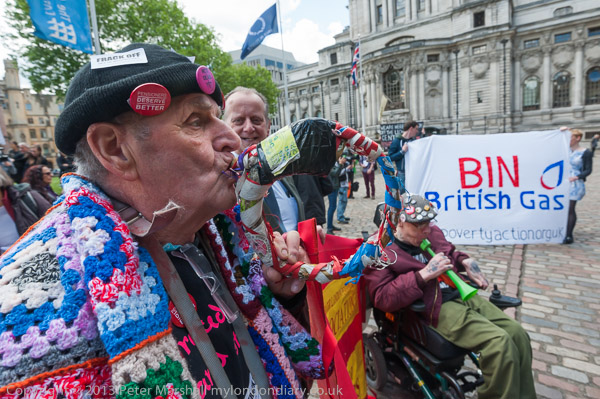 Pensioners
and DPAC were among those supporting the Fuel Poverty Action protest
Pensioners
and DPAC were among those supporting the Fuel Poverty Action protest
more pictures
A protest outside the British Gas AGM called for an end to energy profiteering and fracking which causes energy poverty and climate change and a future based on community ownership, sustainable renewable energy and energy efficiency.
Fuel Poverty Action who organised the protest say that there were over 10,000 extra deaths last winter because people were unable to heat their homes, while Centrica, the parent company of British Gas, made £2.5 billion in 2013. British Gas raised its gas prices by a 10.4 percent in November, and electricity by 8.4 per cent.
One factor in rising bills is the rising cost of gas, and the commitment by government and the energy companies to fracking under much of the UK will not only result in increasing costs, but threaten our water supplies as well as continuing carbon dioxide emissions resulting in climate change and global warming.
The protesters urge and increased investment in renewable energy, which in the long term will result in cheaper energy and will help us tackle climate change. But this isn't popular with the big six energy companies (and the government which is led by their lobbyists) as it enables greater local generation and control of energy, threatening their monopoly of energy production and profits.
As the protesters say "Our energy system & economy are run to make private profit at all costs - our rights to warm home and a safe climate are sidelined. We're being ripped off and left to freeze. We say: things have to change. We need and affordable. sustainable energy system owned by us, not big business."
The protest began as shareholders queued outside the QEII centre in Westminster for the AGM of Centrica, the parent company of British Gas, with protesters with banners and placards handing out fliers. Many of those taking part were disabled and pensioners, two groups disproportionately affected by high energy costs because of their greater needs and generally low incomes.
There were a number of speeches from people in various organisations involved and concerned over fuel poverty, fracking, dirty energy and climate change, including Green Party leader Natalie Bennett and Paula Peters of Disabled People Against Cuts, and pensioners.
The protesters, from 23 poverty, pensioner, climate, housing and renewable energy co-operatives groups, then came together to tear up British Gas energy bills, including a giant bill which was torn up by a disabled protester and a pensioner, before a Lambeth pensioner, Ellen Lebethe, brought out a poster-size Fuel Poverty Action 'Energy Bill of Rights.'
- We all have the right to affordable energy to meet our basic needs.
- We all have the right to energy that does not harm us, the environment, or the climate.
- We all have the right to energy that does not threaten health, safety, water, air, or the local environment of a community.
- We all have the right to a fair energy pricing that does not penalise those who use less.
- We all have the right not to be cut off from energy supply.
- We all have the right not to be forced to have a prepayment meter.
- We all have the right to energy that is owned by us and run in our interests.
One of the protesters then read out a version of Hamlet’s iconic monologue, entitled “To Heat or Eat, that is the question”, and shortly after a member of Reclaim Shakespeare Company who had performed this inside the Centrica AGM with a tin of beans and a skull in his hands came out to report on his performance.
The protesters then planted 100 small windmills made from folded British
Gas bills in the grass outside the QEII centre.
more pictures
Sheffield
Sheffield, Sun 11 May 2014
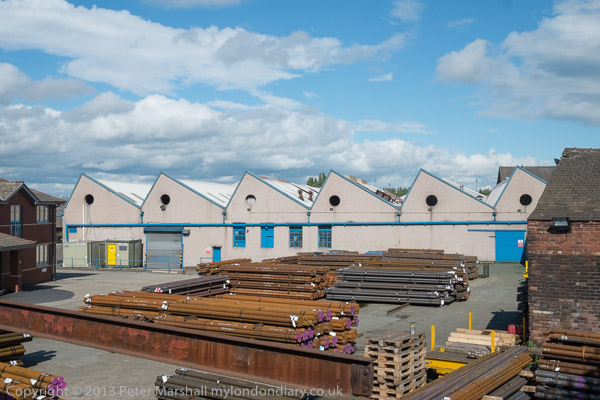
Bedford Steels, Sheffield
more pictures
Our bus arrived in Sheffield a couple of hours before the train we had booked
seats on, so I took a walk from Victoria Keys along the Sheffield & TInsley
Canal, coming back mainly along roads and then briefly along the River Don
before going to the station. I didn't have a map and had to be careful not
to get lost and miss the train.
more pictures
Derbyshire
Castleton etc. Fri 9 - Sat 10 May 2014
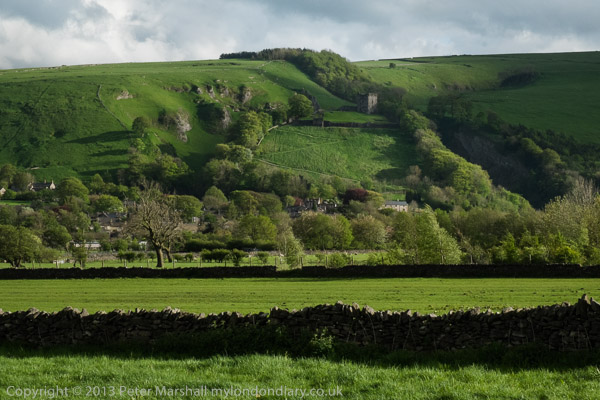
We arrived at Castleton in the late afternoon
more pictures
We travelled to Castleton via a lightning visit to family for lunch in Belper, catching the bus from there to Bakewell and then a second bus to Castleton. That journey between Bakewell and Castleton must be one of the more scenic routes in Britain, and although the bus is only a single-decker, the extra height compared to car or bicycle makes for far better views. And although the downhill parts would be exhilarating on a bike, you always spend far more time slogging uphill.
But though bus (and train) windows are good to look out of, they are seldom great for taking pictures, with dirt and scratches and irregularities, as well as reflections from the various surfaces.
We were there for a conference, but had some time free on Saturday for a
walk. I'd meant to go up Mam Tor, and we set out to do so despite the occasional
rain and heavy showers and having forgotten to bring the walking map. But
we ran out of time and had to settle for a shorter route back to the centre.
more pictures
A walk around the Excalibur Estate
Catford, London. Tue 6 May 2014
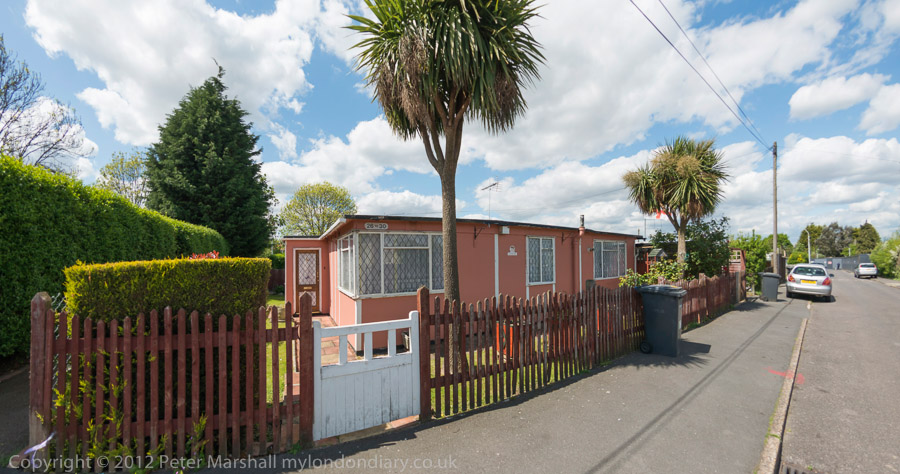
A 146 degree view taken on the Excalibur Estate
more pictures
The Excalibur Estate in Catford was constructed during 1945-6 by German and Italian prisoners of war using two prefabricated designs of housing, and was initially intended to last 10 years, with a promise being made to Lord Forster who gave the LCC the land that it would be returned to parkland when these single-storey two bedroom temporary houses were cleared.
Instead the prefabs has lasted rather longer (a few of the 187 have been rebuilt following fires etc) but most were in habitable condition over 60 years later when Lewisham council decided to knock the lot down and redevelop the site with developers London & Quadrant to provide roughly twice the number of homes.
One end of the estate has already been demolished, and many of the pre-fabs are now empty, but others are still lived in and loved. A hard-fought campaign by residents who wanted to remain failed to save the estate, and attempts to get the estate listed as a unique example of post-war provision, the largest of its kind remaining in Europe, failed, with just half a dozen token prefabs and the estate church being given Grade II listing in 2009, despite English Heritage recommending that 21 buildings be listed. The smaller number allowed by the Dept for Culture, Media & Sport appears to have been as a result of lobbying by L&Q. The unlisted buildings are all expected to be demolished by August 2017.
I've visited the Excalibur Estate a couple of times before. Back in the late 1990s on the second phase of my 'Meridian' project (only work from the first part, north of Greenwich is online), going south from Greenwich I walked through the estate and made several panoramas, and back in October 2010 after reading that the estate was to be demolished I paid another visit taking more pictures and writing about it on >Re:PHOTO.
My return this month was for two reasons. Although the pictures I'd taken in 2010 showed the prefabs well, I didn't think I had captured the nature of the estate as I had done in that earlier panorama, so I wanted to make some new panoramas. But also I had been meaning since it opened to visit the Prefab Museum, an art project by Elisabeth Blanchet. It wasn't originally intended to be open for more than a month or two, but will be open Saturdays only from 11am till 5pm until 30th September 2014, with a number of special events - check on the Facebook page.
Inside the Prefab Museum is a line marked across the floor of one room where
the Greenwich Meridian runs - I think my Meridian picture may include the
bungalow that is now the museum. It isn't of course a huge museum, but is
packed with interesting material and I recommend a visit to this and the estate.
Or if you can't physically get there, my panoramas will give you a good idea
of what you are missing.
more pictures
Support for Harmondsworth Mass Hunger Strike
Harmondsworth, Middx. Mon 5 May 2014
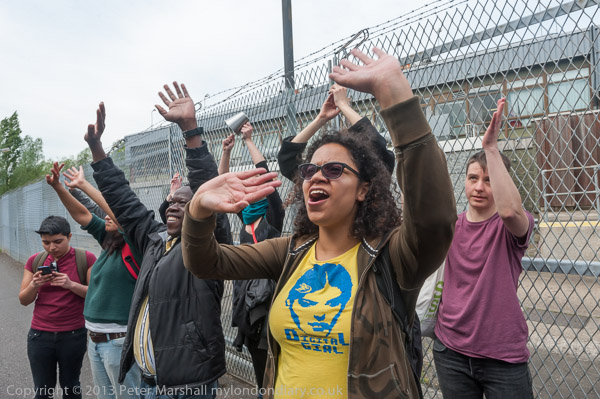
Protesters shout and wave at prisoners who are waving
back from inside the immigration prison
more pictures
Protesters at Harmondsworth Immigration Detention Centre showed solidarity with prisoners who went on mass hunger strike on Friday over the unfair 'fast track' system which denies many a proper hearing and other problems in the private-run prison.
The hunger strike and protest by over 300 of the prisoners at the centre, just to the north of Heathrow, was suspended over the weekend after Home Office officials met delegates and promised to give answers to their demands on Tuesday, 6 May. The protest was sparked off by the failure of the only fax machine at the prison, essential for those who are trying to prepare their cases.
The fast track system, introduced by the Blair government, is inherently unfair, giving asylum seekers little or no time to prepare their cases and has resulted in many unfair decisions. It disadvantages those in most need of asylum who are unlikely to have prepared essential documents in advance and to be in a condition to represent themselves effectively. And as they are held in detention it is very difficult or impossible for them to prepare a case, particularly when communication with the outside world is limited and difficult.
The prisoners also complain about the lack of proper healthcare at this and other Immigration Removal Centres. A recent report by HM Inspectorate of Prisons included the case of Alois Dvorzac, an 84-year-old who suffered from dementia sufferer, who died after being held without any proper medical attention for almost three weeks before being taken in handcuffs to hospital.
Some are being held in Harmondsworth despite having agreed to voluntary repatriation, in one case for 17 months, presumably because of administrative incompetence by the Home Office. It is hard to believe it can take that long to book a plane ticket.
Others have got stuck in Harmondsworth after being transferred there from other other immigration prisons to enable them to have interviews in London, but the Home Office has simply failed to make the necessary arrangements to take them back to the centre where they can again consult with their lawyers and receive family visits.
The prisoners also complain of a lack of legal help and advice at the centre, and say that sometimes important faxes and documents sent to them over the Internet about their cases take up to 5 hours to reach them, impeding progress on their cases.
The Harmondsworth prison is run by GEO Group, who have tried to play down the protest, saying that it only involved 30 or 40 prisoners missing a single meal. What does seem to be agreed is that the protest was a peaceful one, with the prisoners delivering a petition stating their demands. And what also seems clear is that unless GEO and the Home Office can sort out at least some of the legitimate causes for complaint the hunger strike and other protests will restart.
Just under 30 protesters make the trek out to Harmondsworth on a Bank Holiday
afternoon, and after around 15 minutes gathering at the main entrance to the
site were approached by a couple of police officers, who asked politely what
they intended to do. Receiving no answer, the officer told them that so long
as they behaved sensibly and caused no trouble they would be allowed to protest.
more pictures
IWGB Cleaners at Royal Opera
Covent Garden, London. Sat 3 May 2014
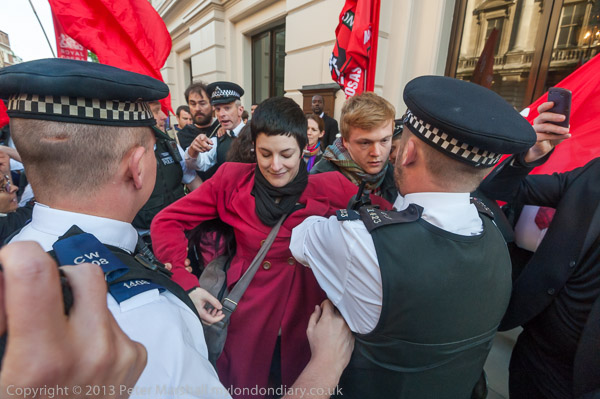
Police grab one of the protesters outside the Opera House
more pictures
Cleaners at the Royal Opera House held a noisy demonstration outside in the evening, shouting and banging drums. They demand recognition of their IWGB union and reinstatement for sacked workers, victimised for union activities or through nepotism.
The protesters called for an end to the abuse of staff by MITIE and for the recognition of their union, the IWGB. They also demanded the reinstatement of Yovana, Vivian and Reinaldo. They claim that some of their workers at the Royal Opera House have lost their work because managers have brought in people from their own community in their place and that anyone who stands up for their rights at work is in danger of being replaced. The workplace rep, Vivian, who spoke at the protest has not yet been given a proper reason for her sacking, other than that she showed IWGB president Alberto Durango the way to the door of the Opera House.
Earlier in the year action by the IWGB cleaners and the threat of a picket line which would have disrupted the BAFTA awards ceremony, with some participants making clear they would not cross a picket line. The management made concessions and the strike was called off, but the management of the Royal Opera House and cleaner's contract employees MITIE 'negotiated' with another union, refusing to deal with the IWGB, a grass-roots union which has achieved a great deal for many of its members through spirited high-profile actions such as this evening's return to the ROH.
Mitie is a very profitable company and could afford to treat its employees with decency and respect and give them better conditions. As the IWGB posters pointed out, CEO Ruby McGregor-Smith was paid £1,377,000 in 2013. There is no justification for not recognising the union which the employees actually belong to - in this case the IWGB, although the law enables them to refuse to do so by having an agreement with another union. It is certainly a blot on that union's reputation that is is willing to collude with the management in this way.
The cleaners and their supporters met outside the Opera House and then marched down to the ROH entrance in the Covent Garden Plaza with drums beating and IWGB President Alberto Durango calling out their grievances and demands on a powerful megaphone. Security staff stood in the doorway and the protesters made no attempt to enter the building, but continued their noisy demonstration outside.
After a few minutes they marched around to the front of the opera house in Bow Street, where as well as security staff a dozen or so police came to watch them. When they had been there around half an hour and I was expected the protest to end shortly, the police unexpectedly waded in to the protesters and tried to grab one woman. Other protesters pulled her back from them and for some minutes the situation was very confused.
The protest continued and after another quarter of an hour there were speeches from some of those taking part, including a worker who had lost her work at the Opera House because one of the managers there had brought in other workers from his own community to replace her, and Vivian who has been sacked because of her union activities. Another of the protesters, Liliana also spoke, complaining about the action by the police who had hit a number of women, in particular pointing to the Inspector in charge, Inspector Rowe, as one of the offenders. He continued to stand there taking notes.
The protest, which I think had been prolonged by the police action, was still
continuing when I had to leave an hour and a half after it started. Previous
protests by the IWGB have seldom lasted more than an hour.
more pictures
Horse Traps at the Nag's Head
Covent Garden, London. Sat 3 May 2014
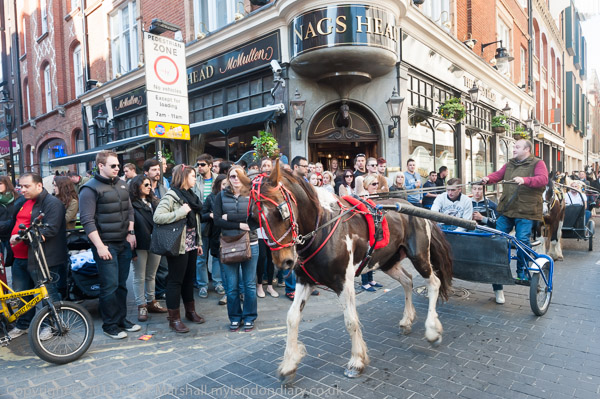 The
horses had problems on the polished stones which made their hooves slip
The
horses had problems on the polished stones which made their hooves slip
more pictures
An outing to London on horse-drawn traps from around the south-east surprised
tourists in Covent Garden as they parked outside the Nag's Head. The traps
had started at Forest Gate and had already visited Borough Market on their
route around London.
more pictures
Baloch Hunger Strike
Whitehall, London. Sat 3 May 2014
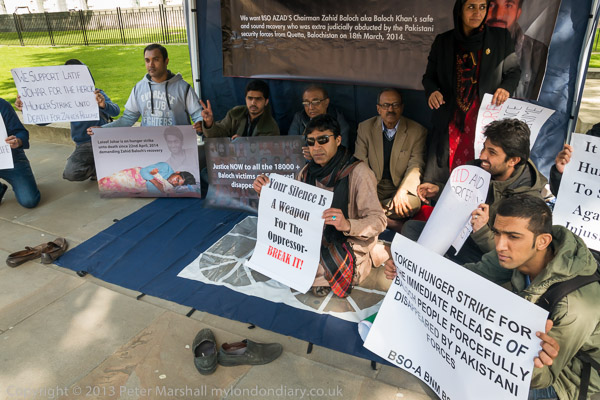
Balochs opposite Downing St in a token hunger strike
more pictures
Balochs staged a token hunger strike on Whitehall calling for the immediate release of all those forcefully disappeared by Pakistani forces.
The strike was in support of the hunger strike by student activist Latif
Johar of the Baloch Students Organisation-Azad (BSO-A) who began a hunger
strike outside the Karachi Press Club on April 22 in protest at the disappearance
by Pakistan security forces of the BSO-A chair Zahid Baloch in March.
(Johar continued his hunger strike for 46 days, losing over 30 kilograms,
ending his protest after an appeal from the Asian Human Rights Commission,
who promised they would raise the issue at the United Nations’s International
Commission for Missing Persons.)
more pictures
20 years of Women Vicars
Westminster, London. Sat 3 May 2014
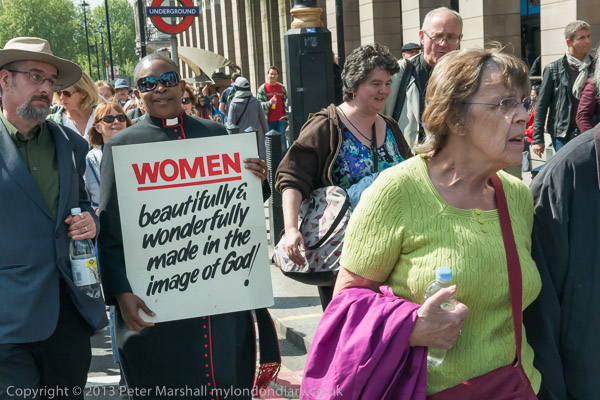
Reverend Rose Hudson-Wilkin carries her placard from
20 years ago on the march to St Paul's
more pictures
On the 20th anniversary of the first women to be ordained by the Church of England, a thousand or more women priests went to a rally in Dean's Yard before marching to St Paul's Cathedral for a service.
Although the Congregational Church had its first women minister in 1919, it took the Church of England another 75 years before they caught up. But they ordained their first women as priests in 1994, and women now make up a large proportion of the church.
Dean's Yard had a large crowd of women and rather fewer men, perhaps around a thousand in all, listening to speeches by some of the women ordained in 1994, and the event was just coming to an end as I took photographs of the final few speakers and some of the audience, the majority of whom were wearing dog collars.
Not all of those present were fit enough for the longish walk to St Paul's, though there were quite a few in wheelchairs who did so. Although the march soon became rather spread out, it was still fairly impressive.
Among those marching was the Rev Rose Hudson-Wilkin,the Jamaican-born vicar
of Holy Trinity Church, Dalston and All Saints Church, Haggerston (and also
finding time to be Speaker’s chaplain at the House of Commons, priest
vicar at Westminster Abbey and chaplain to the Queen. She marched carrying
the same placard she had carried when the church was making its decision to
ordain women in 1994, with the message "Women - beautifully & wonderfully
made in the image of God!" She is widely expected to be one of the first
women to become Bishops when the Church of England finally decides they can
have women bishops.
more pictures
Anti-Fur Picket at Harvey Nichols
Knightsbridge, London. Sat 3 May 2014
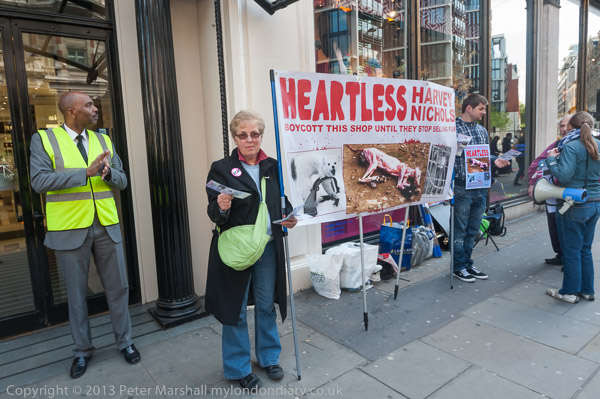 Weekly
protest at ''Heartless Harvey Nichols' for selling fur farmed abroad under
inhumane conditions
Weekly
protest at ''Heartless Harvey Nichols' for selling fur farmed abroad under
inhumane conditions
more pictures
Protesters continue a weekly vigil outside Knightsbridge fashion store Harvey
Nichols calling on shoppers to boycott them for selling animal fur products,
which come almost entirely from farms with exceedingly cruel practices banned
in the UK.
more pictures
Restore the Ethiopian Monarchy
Ethiopian Embassy, London. Sat 3 May 2014
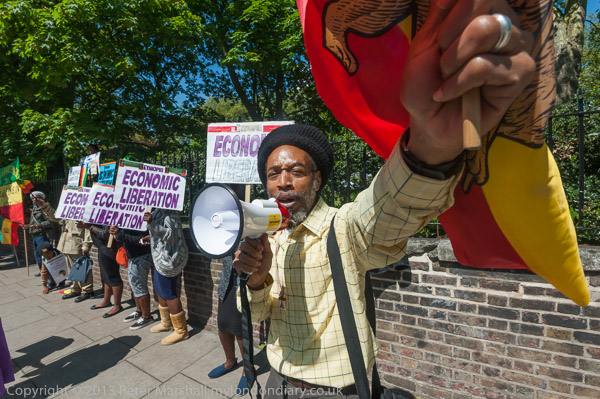
The placards read 'Economic Liberation', although Selassie
was deposed because of economic failures
more pictures
Rastafarians of the Church of Haile Selassie I protested opposite the Ethiopian Embassy calling for the restoration of the Dynasty of Emperor Haile Selassie 1st to bring about economic liberation of the country.
The Ba Beta Kristiyan Church of Haile Selassie I in Cricklewood holds an annual protest outside the embassy in Kensington calling for the return of the monarchy in their country, as well as organising an on-line petition. Ethiopia was the only African country to defeat the European colonialists and was the first independent African state to become a member of the League of Nations and the UN under Emperor Haile Selassie I.
Haile Selassie was am Ethiopian Orthodox Christian and widely regarded as a powerful but repressive and undemocratic ruler. Rastafarians see him as a messiah who will bring in a new golden age.
In 1974 an economic crisis in Ethiopia led to riots and eventually a group of army officers, the DERG took power, and Haile Selassie, then 83, died under possibly suspicious circumstances following an operation in prison. The communist Derg, formally abolished in 1987 was eventually replaced in 1991 following military defeat by a coalition of opposition forces after support from the Soviet Union had ended. Since then the country has been nominally democratic, but effectively an authoritarian one-party state with fraudulent elections and strict control of the opposition and press.
The petition - now closed - by The Church of Haile Selassie 1st "to
bring back a traditional culture which unites the people in ethiopia/afrika
,creating peace and stability which will spread to the wider world. 1936 -
41 restoration, four years later saw the end of world war two."
attracted 61 supporters on Change.org.
more pictures
Joint Enterprise - NOT Guilty By Association
London, London. Sat 3 May 2014
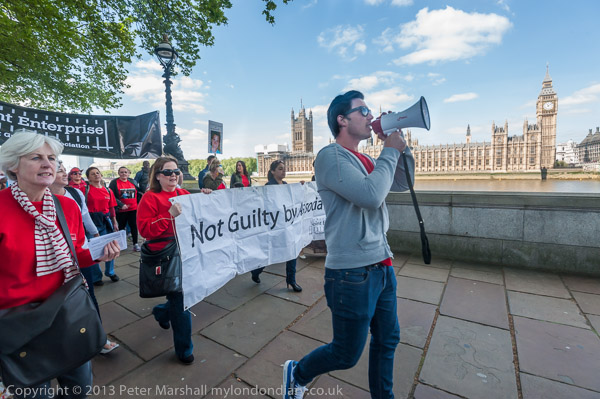
Protesters march towards Parliament along the Albert Embankment
more pictures
Families fighting to abolish a 300 year old law that has wrongfully imprisoned family members in a gross breach of human rights marched through London today campaigning to get the law. introduced to stop dueling, repealed and their loved ones freed.
Under 'Joint Enterprise' you can be convicted of a crime you took no part in - even if you were not present when it was committed. Hundreds if not thousands are in British jails having been convicted under this law, which was introduced three hundred years ago in a clamp-down on dueling, enabling the seconds and doctors who attended duels to be arrested as well as the actual duelists.
The law appears to be currently interpreted by judges and the courts in a way that makes almost any connection with a person committing a crime a matter of common purpose, and failing to apply the safeguards of calling on the prosecution to prove the existence of any act by the defendant that assisted the commission of the offence, or to show that the defendant knew that the crime that occurred was a real possibility, or that the defendant intended to assist the perpetrator of the illegal act that occurred.
In a recent statement, Justice Minister Chris Grayling stated that for a conviction of joint enterprise to be upheld it was not necessary for their to be any plan by those taking part - a 'knowing look' shared between the defendants would be enough to convict. In other words, no real evidence at all is required - or in most cases has it been offered.
Without the proper safeguards, the offence has become popular for police and prosecution, enabling them to get convictions where the is no real evidence against those who end up with lengthy prison terms in what is often clearly a miscarriage of justice and a violation of the human rights of those on trial.
Almost all of the just over fifty people taking part in today's march were from families of those who have been unjustly imprisoned, many for very lengthy terms of up to 30 years. Most commonly the offence has been used against young people after stabbings and other violence on the streets, often wrongly accusing some of being gang members. It has been used disproportionately against Afro-Caribbean young men, although most of those supporting today's protest were not Afro-Caribbean.
The protest was organised by JENGbA - Joint Enterprise - NOT Guilty By Association - and co-ordinator Gloria Morrison led the march which went from just behind Tate Britain over Lambeth Bridge and along the embankment to recross the river over Westminster Bridge to a rally opposite Parliament. After the rally those taking part intended to picnic in Victoria Gardens before continuing their protest, handing out leaflets and getting signatures for their petition against the use of the joint enterprise law. A similar protest was also taking place in Manchester today.
Last year Gloria Morrison received the Sheila McKechnie Foundation's London
Social Justice Award, sponsored by the Trust for London, for campaigners
tackling poverty and inequality in London for her work for JENGbA. She got
involved with campaigning on the issue when her son’s best friend was
convicted under joint enterprise. JENGbA aims to reform the law, and wants
to raise awareness about the way in which it is currently being applied in
the courts. They also campaign on behalf of and with those who have been wrongfully
convicted under the law.
more pictures
May Day Rally
Trafalgar Square, London. Thu 1 May 2014
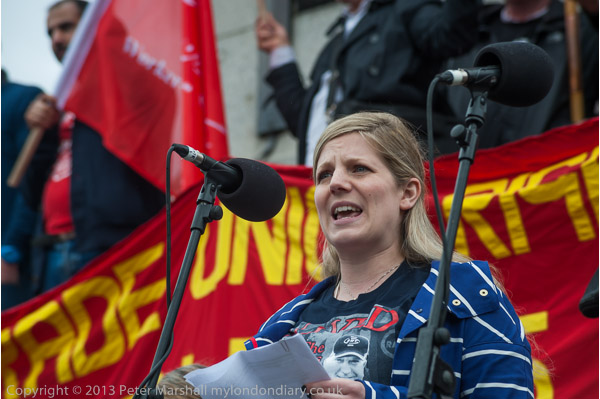 Bob
Crow's daughter Natasha Hoarau speaking in Trafalgar Square
Bob
Crow's daughter Natasha Hoarau speaking in Trafalgar Square
more pictures
The London May Day March in support of left unity, solidarity and trade union rights ended at a rally in Trafalgar Square with speeches in honour of Tony Benn & Bob Crow and powerful speeches from several trade unionists calling for a fairer society.
Many of the marchers left after the tributes to Tony Benn and Bob Crow, which
included a video for each of them with clips of some of there more memorable
sound bites.
more pictures
May Day March for Bob Crow & Tony Benn
Clerkenwell, London. Thu 1 May 2014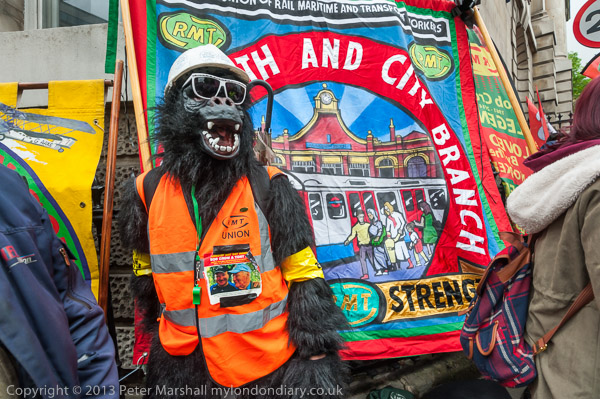
The RMT turned out in force to remember Bob Crow and
Tony Benn
more pictures
Thousands of trade unionists, human rights activists, members of London's diverse communities, pensioners and others from the left marched in a display of unity, solidarity and support of trade union rights and in honour of Tony Benn & Bob Crow.
Both Tony Benn and Bob Crow had been regular attenders at the annual May Day march in London and had spoke at many of the rallies after the march, as well as on so many other occasions. Both were men who had dedicated their lives to socialism and to improving the condition of ordinary workers, to equality and to a fairer social system. Both are sadly missed.
Traditionally May Day has been a day when everyone across the left has put aside sectional differences to march together for a new future, recognising that their common cause is stronger and more important than the factional differences. Although many may wince at the large images of Stalin which some groups parade (as I do) we can come together in a common belief in humanity and the rights of all over the world to a decent existence rather than in the rights of a tiny minority to unbelievable wealth which drives capitalism.
As usual the march gathered at Clerkenwell Green, a site with a history of political radicalism at lest since the Peasant's revolt of 1381, and in the 19th century with the Chartists, the Tolpuddle Martyrs, William Morris and Lenin, and since 1933 the home of the Marc Memorial Library.
As I walked towards it, from several hundred yards away it was clear that this year's march was going to be larger than usual. Although I arrived before the time for meeting and over an hour before the march was due to start I could already see a forest of flags and banners. In previous years the march has been dominated by those communities in London from countries where May Day is celebrated on a huge scale, particularly London's Turkish and Kurdish peoples. While UK unions such as the RMT had been present, their numbers have been rather smaller. But today the RMT was out in force to honour its leader, Bob Crow, who died on March 11th. There were RMT banners from around the country and I lost count of how many, and hundreds if not thousands of flags and placards.
The march is organised by the London May Day Organising Committee and this is supported by a wide range of organisations including 'GLATUC, S&ERTUC, UNITE London & Eastern Region, CWU London Region, PCS London & South East Region, ASLEF, RMT, TSSA, NUT, MU London, FBU London & Southern Regions, GMB London & Southern Regions, UNISON Greater London Region, Peoples Assembly, NPC, GLPA and other Pensioners’ organisations and organisations representing Turkish, Kurdish, Chilean, Colombian, Peruvian, Portuguese, West Indian, Sri Lankan, Cypriot, Tamil, Iraqi, Iranian, Irish, Nigerian migrant workers & communities plus many other trade union & community organisations'.
These groups are rather mixed up in my pictures, particularly those taken before the start of the march, when I was wandering rather randomly around Clerkenwell Green where the march gathered. The pictures are roughly in the order that I took them.
This year they had the march a little more organised than in previous years, necessary because of extra numbers and the two men being honoured. It set off promptly at 1pm with Bob Crow's wife and family members with others at the front of the march, and with the RMT Brass band playing behind them. Members of Tony Benn's family were behind the main May Day banner,and they were followed by many trade union banners, then the international and community groups, and finally other groups, including anarchists and Occupy.
As well as the RMT band, there was another marching band, and a Socialist Choir, the Strawberry Thieves, who performed as the marchers walked past.
I left the march at Holborn, around halfway to their rally at Trafalgar Square.
more pictures
top of page
All pictures on this section of the site are Copyright © Peter Marshall 2014; to buy prints or for permission to reproduce pictures or to comment on this site, or for any other questions, contact me.

